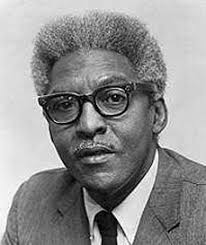(March 17, 1912 – August 24, 1987) was an American civil rights activist, important largely behind the scenes in the civil rights movement of the 1960s and earlier. He is credited as the chief organizer of the 1963 March on Washington for Jobs and Freedom. He counseled Martin Luther King, Jr. on the techniques of nonviolent resistance. He became an advocate on behalf of gay and lesbian causes in the latter part of his career. Homosexuality was criminalized at the time, which made him a target of suspicion and compromised some of his effectiveness. Many African-American leaders were concerned that Rustin's sexual orientation and past Communist membership would undermine support for the civil rights movement. U.S. Representative Adam Clayton Powell, Jr., who was a member of the SCLC's board, forced Rustin's resignation from the SCLC in 1960 by threatening to discuss Rustin's morals charge in Congress.[7] Although Rustin was open about his sexual orientation and his conviction was a matter of public record, the events had not been discussed widely outside the civil rights leadership. When Rustin and Randolph organized the March on Washington for Jobs and Freedom in 1963, Senator Strom Thurmond railed against Rustin as a "Communist, draft-dodger, and homosexual." He produced an FBI photograph of Rustin talking to King while King was bathing, to imply that there was a same-sex relationship between the two. Both men denied the allegation of an affair. Despite King's support, NAACP chairman Roy Wilkins did not want Rustin to receive any public credit for his role in planning the march.
Thursday, February 10, 2011
Black Gay Trailblazer-Honoring Black History Month
Bayard Rustin

(March 17, 1912 – August 24, 1987) was an American civil rights activist, important largely behind the scenes in the civil rights movement of the 1960s and earlier. He is credited as the chief organizer of the 1963 March on Washington for Jobs and Freedom. He counseled Martin Luther King, Jr. on the techniques of nonviolent resistance. He became an advocate on behalf of gay and lesbian causes in the latter part of his career. Homosexuality was criminalized at the time, which made him a target of suspicion and compromised some of his effectiveness. Many African-American leaders were concerned that Rustin's sexual orientation and past Communist membership would undermine support for the civil rights movement. U.S. Representative Adam Clayton Powell, Jr., who was a member of the SCLC's board, forced Rustin's resignation from the SCLC in 1960 by threatening to discuss Rustin's morals charge in Congress.[7] Although Rustin was open about his sexual orientation and his conviction was a matter of public record, the events had not been discussed widely outside the civil rights leadership. When Rustin and Randolph organized the March on Washington for Jobs and Freedom in 1963, Senator Strom Thurmond railed against Rustin as a "Communist, draft-dodger, and homosexual." He produced an FBI photograph of Rustin talking to King while King was bathing, to imply that there was a same-sex relationship between the two. Both men denied the allegation of an affair. Despite King's support, NAACP chairman Roy Wilkins did not want Rustin to receive any public credit for his role in planning the march.
(March 17, 1912 – August 24, 1987) was an American civil rights activist, important largely behind the scenes in the civil rights movement of the 1960s and earlier. He is credited as the chief organizer of the 1963 March on Washington for Jobs and Freedom. He counseled Martin Luther King, Jr. on the techniques of nonviolent resistance. He became an advocate on behalf of gay and lesbian causes in the latter part of his career. Homosexuality was criminalized at the time, which made him a target of suspicion and compromised some of his effectiveness. Many African-American leaders were concerned that Rustin's sexual orientation and past Communist membership would undermine support for the civil rights movement. U.S. Representative Adam Clayton Powell, Jr., who was a member of the SCLC's board, forced Rustin's resignation from the SCLC in 1960 by threatening to discuss Rustin's morals charge in Congress.[7] Although Rustin was open about his sexual orientation and his conviction was a matter of public record, the events had not been discussed widely outside the civil rights leadership. When Rustin and Randolph organized the March on Washington for Jobs and Freedom in 1963, Senator Strom Thurmond railed against Rustin as a "Communist, draft-dodger, and homosexual." He produced an FBI photograph of Rustin talking to King while King was bathing, to imply that there was a same-sex relationship between the two. Both men denied the allegation of an affair. Despite King's support, NAACP chairman Roy Wilkins did not want Rustin to receive any public credit for his role in planning the march.
Subscribe to:
Post Comments (Atom)
No comments:
Post a Comment